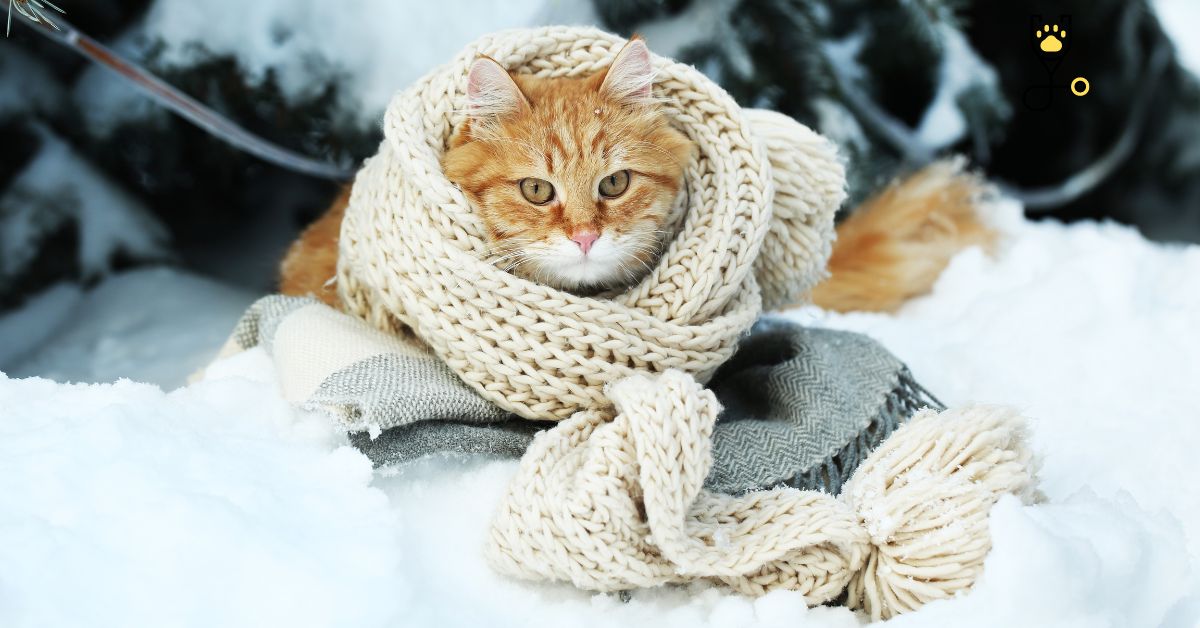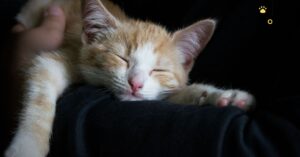Cats are independent creatures that typically don’t need a lot of help from their owners. But what happens when your cat catches your cold? This post will give you a full guide on what to do if your cat catches your cold, including how to treat them and how to prevent it from happening again. Keep reading for more information!
What is cold in cats?
Cats are susceptible to colds just like humans, but the causes and symptoms of a cold in cats can be very different than those seen in humans. In general, a cold in cats is caused by bacterial or viral infections that can lead to runny noses, coughing, sneezing, and other flu-like symptoms.
How do cats catch colds?
While it’s rare for cats to catch human colds, they are still vulnerable to contracting them if you have close contact with your cat. Some common ways this can occur include:
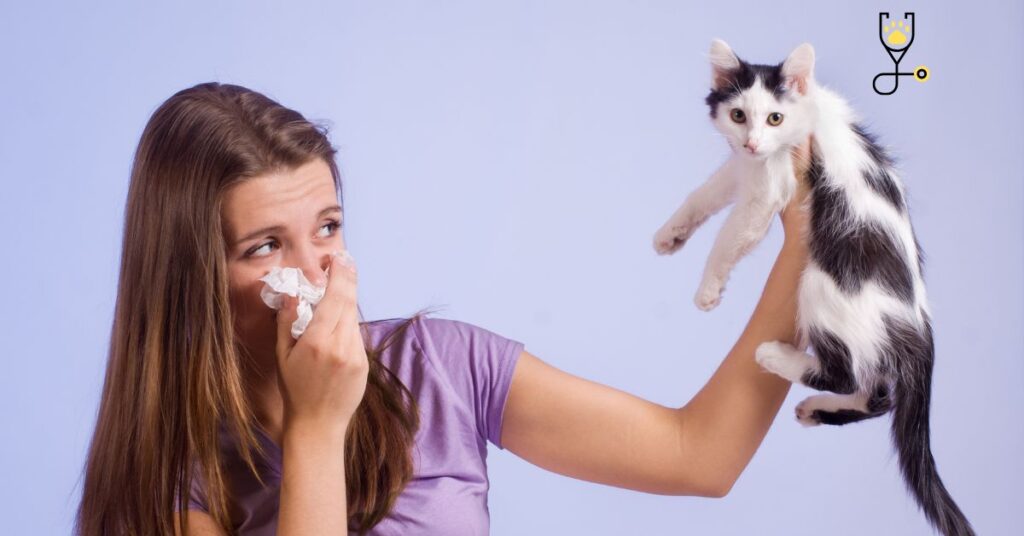
1. Sneezing or coughing near your cat: If you have a cold, sneezing or coughing near your cat can allow the rhinovirus to spread into the air and get on your cat’s fur.
2. Kissing or petting your cat: If you kiss or pet your cat while you have a cold, there is a small chance that some of the rhinoviruses could transfer from you to them.
3. Sharing food or water: If you share any foods or beverages with your cat while you have a cold, there is a chance that the rhinoviruses can spread from you to them.
4. Not washing your hands before petting your cat: If you don’t thoroughly wash your hands after touching surfaces where the virus may be present, there is a small chance that some of it could get on your cat’s fur and transfer over.
5. Poor indoor air quality: Poor indoor air quality can also increase the risk of cats catching a human cold if they are exposed to too much dust or other contaminants in the air.
Symptoms of cold in cats
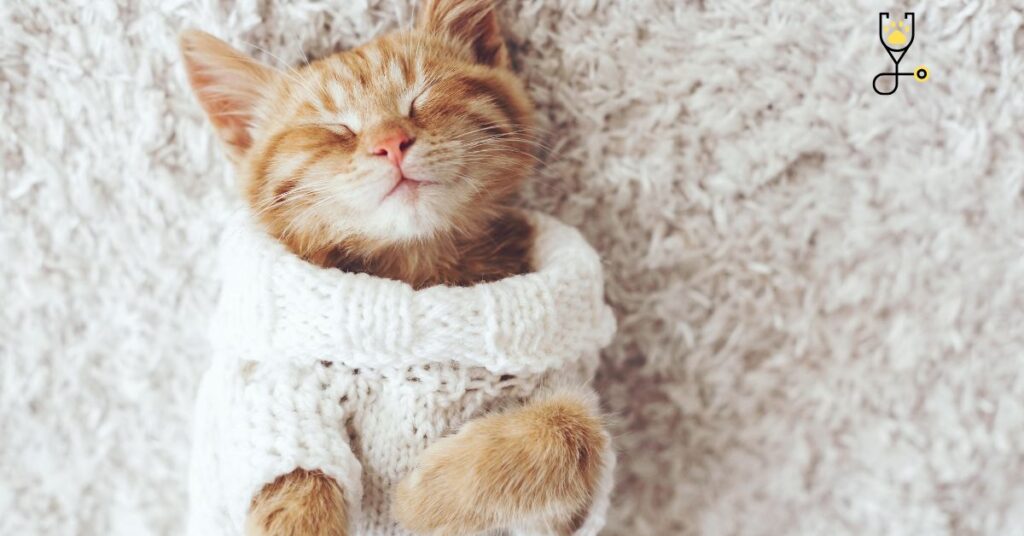
1. Sneezing or coughing: One of the first indicators that your cat may have a cold is if they start sneezing or coughing. This could be due to the rhinoviruses infecting their nose or throat, respectively.
If your cat catches your cold, it may exhibit some of the following symptoms:
2. Runny nose: If your cat has a runny nose, it’s possible that they also have a cold. The mucus from a runny nose can allow for easier transfer of the virus between people and animals.
3. Lethargy: Cats who are feeling under the weather from catching a cold may also be lethargic and unwilling to move around much.
4. Loss of appetite: If your cat is feeling sick, it may also experience a loss of appetite and stop eating as much.
5. Fever: A fever typically means that your cat’s immune system is working hard to fight off the rhinoviruses. This can be slightly worrying since fevers in cats are not common, but it’s important to keep an eye on them if you notice this symptom.
Treatments for cold in cats
There is no specific course of treatment for cats with a cold since there isn’t any medication specifically designed for treating this condition in cats. However, there are some steps you can take to help support their immune system and ease their symptoms until they recover from the virus naturally:
1. Keep your cat indoors: This is a good idea regardless of whether or not they have a cold, but it’s especially important when they are sick. Keeping them inside will help reduce their risk of exposure to dust and other pollutants that could make their symptoms worse.
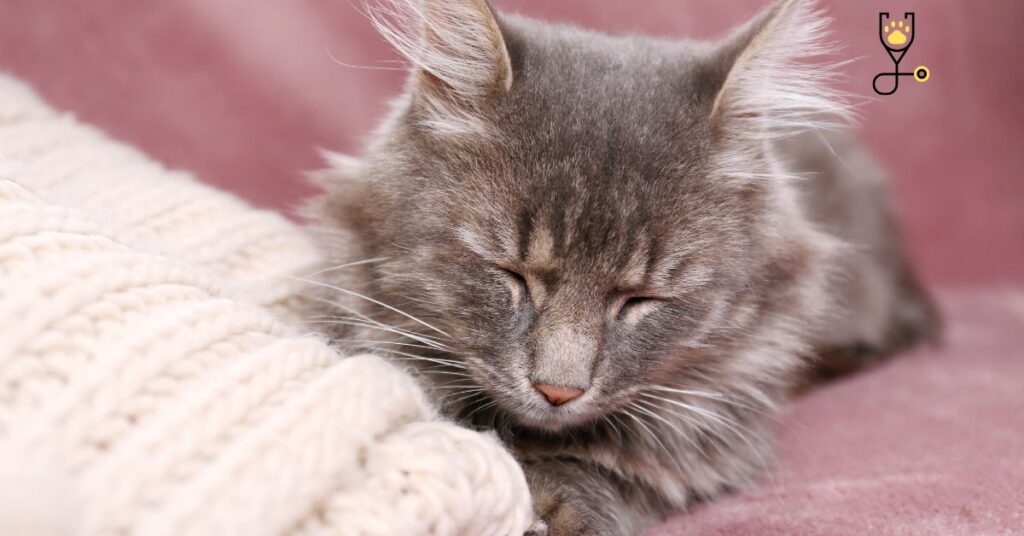
2. Provide lots of rest: If your cat becomes tired and lethargic from catching your cold, it’s essential to allow them plenty of time to rest in order for their immune system to focus on fighting off the virus.
3. Keep a humidifier running: A humidifier can help keep the air around your cat moist which can also be beneficial for helping them recover from the cold more quickly.
4. Feed a healthy diet: As always, a diet high in nutrients can help support your cat’s immune system and make it easier for them to fight off the cold virus. You may want to ask your veterinarian what specific diet changes you can make if your cat has a cold.
5. Consider using supplements: There are some supplements that can also help boost your cat’s immune system and reduce its risk of catching diseases such as a cold. Some great options include probiotics, omega-3 fatty acids, and vitamin C.
If your cat catches a human cold, it’s important to take steps to help them recover as quickly as possible while limiting its exposure to others until they have fully recovered from the virus. By following the tips above, you can be sure that you’re doing all you can to help your sick cat feel better.
How to prevent your cat from catching your cold
There are several steps that you can take to help prevent your cat from catching your cold. This include:
1. Washing your hands frequently: One of the best ways to reduce the risk of your cat catching a cold is to wash your hands regularly, especially after interacting with others who may be sick or touching surfaces where the virus may be present.
2. Minimizing exposure to dust and other pollutants: Keeping your cat indoors as much as possible and avoiding exposing them to allergens, dust, or other contaminants in the air can also help reduce their risk of contracting a cold virus.
3. Feeding them a healthy diet: Ensuring that your cat gets plenty of nutrients from their food can also help boost their immune system and make it harder for them to become infected by a cold virus.
4. Using supplements: There are some supplements such as probiotics, omega-3 fatty acids, or vitamin C that you can give your cat in order to support its immune system and reduce its risk of catching a cold.
Prognosis
Overall, the prognosis for cats that catch a cold virus will depend on several factors, including their overall health and the severity of their symptoms. In general, with prompt treatment and supportive care, most cats will recover from a cold within 1-2 weeks. However, in some cases, more serious complications such as secondary infections or pneumonia may develop which can significantly worsen your cat’s prognosis. For this reason, it is important to consult your veterinarian if you notice any concerning symptoms or if you are concerned about your cat’s recovery. With proper care and attention, most cats with a cold should be able to make a full recovery within a few weeks.
Conclusion
If your cat catches a cold, it is important to take steps to help them recover as quickly as possible while minimizing its exposure to others and providing them with the support and care they need. This can include washing your hands regularly, feeding your cat a healthy diet, using supplements or other strategies to boost their immune system, and getting prompt treatment if any complications develop. With proper care and attention, most cats will be able to recover from a cold within 1-2 weeks. However, in some cases more serious complications may develop, so it is important to consult your veterinarian if you have any concerns about your cat’s health or recovery.
FAQ’s
Some common signs of a cold in cats include sneezing, coughing, fever, runny nose or eyes, lethargy or other changes in behavior, and loss of appetite.
There are several steps that you can take to help your cat feel better if they have a cold. These may include washing your hands regularly to reduce the risk of spreading the virus to your cat, feeding them a healthy diet with plenty of nutrients to support their immune system and make it harder for them to catch an infection, using supplements such as probiotics or omega-3 fatty acids to boost their immune system and reduce their risk of infection, and getting prompt treatment if you notice any concerning symptoms or if your cat experiences any complications. With proper care and attention, most cats with a cold should be able to recover within 1-2 weeks. However, in some cases more serious complications may develop, so it is important to consult your veterinarian for help if you have any concerns about your cat’s health or recovery.
There are several things that you can do to help prevent your cat from getting a cold. These may include keeping your cat indoors as much as possible to minimize their exposure to dust and other pollutants in the air, feeding them a healthy diet with plenty of nutrients, using supplements such as probiotics or omega-3 fatty acids, and getting prompt treatment if you notice any concerning symptoms or if your cat experiences any complications. By taking these steps, you can help reduce your cat’s risk of catching a cold virus and ensure that they receive the support and care that they need for recovery.
If your cat experiences any severe symptoms such as difficulty breathing, vomiting, lethargy, or other changes in behavior that seem concerning, it is important to seek emergency care from a veterinarian immediately. In these cases, your cat may be at risk of developing more serious complications such as secondary infections or pneumonia, which can significantly worsen its prognosis and require immediate treatment. By seeking prompt care from a veterinarian, you can help ensure that your cat receives the support and care they need during recovery.
There are several steps that you can take to help prevent your cat from catching a cold virus. These may include minimizing your cat’s exposure to dust and other pollutants in the air by keeping them indoors, feeding them a healthy diet with plenty of nutrients, using supplements such as probiotics or omega-3 fatty acids to boost their immune system and reduce their risk of infection, and getting prompt treatment if you notice any concerning symptoms or if your cat experiences any complications. By taking these steps, you can help ensure that your cat remains healthy and well-protected against cold viruses and other infections.

